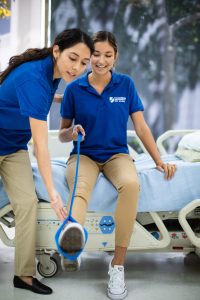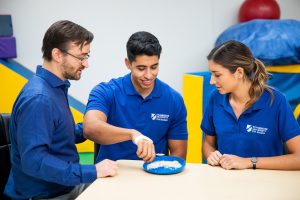Key Traits of Occupational Therapy Assistants
As you consider or pursue a career as an Occupational Therapy Assistant (OTA), you’re stepping into a rewarding field that profoundly impacts people’s lives. Whether exploring OTA programs or already immersed in your studies, cultivating certain traits will help you in your education. Below are six key traits that will help you through any occupational therapy assistant program.
Compassion and Empathy: The heart of occupational therapy is the desire to help others. OTA students who thrive possess a deep sense of empathy, allowing them to learn to connect with their clients on a personal level. They know how to understand clients’ challenges and approach each interaction with kindness and understanding.
Strong Communication Skills: Effective communication is essential for OTA students to collaborate with clients, their families, occupational therapists, and other healthcare professionals like nurses, physical therapists, and speech therapists. They should practice excellence in verbal and non-verbal communication, listening attentively, and conveying information clearly and concisely.
Adaptability and Flexibility: Every client’s journey is unique, requiring OTA students to learn to adapt their approach to meet individual needs and circumstances. They must learn to demonstrate flexibility, adjust their strategies as needed, and embrace change with resilience and positivity.
Attention to Detail: From assessing clients’ progress to documenting progress in treatment plans, OTA students must pay close attention to detail in their work. They should be meticulous in their observations and documentation, ensuring accuracy and precision in their practice.
Problem-Solving Abilities: Occupational therapy often involves overcoming challenges and finding creative solutions to improve clients’ daily functioning. OTA students should possess strong problem-solving skills, think critically and innovatively to address barriers and achieve meaningful client outcomes.
Team Collaboration: OTA students will learn to work closely with occupational therapists and other healthcare professionals to care for their clients. They should value collaboration and teamwork, actively contributing to interdisciplinary teams and fostering positive collaborative relationships.
Becoming an Occupational Therapy Assistant (OTA) requires more than technical skills—it demands a unique blend of compassion, communication, adaptability, attention to detail, problem-solving abilities, and teamwork.
Occupational Therapy Assistants work closely under the supervision of occupational therapists to help individuals improve their ability to perform daily tasks. They support clients in building independence at home, at school, or in the community.1
Stanbridge highlights compassion and empathy, strong communication skills, adaptability and flexibility, attention to detail, problem-solving abilities, and team collaboration as foundational traits that help OTA students succeed in both their studies and future practice.
Empathy enables OTA students to connect with clients on a personal level, understand their challenges, and approach interactions with kindness and understanding, forming a key part of effective patient care.
Effective communication, both in listening and expressing, is important for OTAs to collaborate with clients, their families, occupational therapists, and other healthcare professionals like nurses, PTs, and speech therapists.
Each client’s situation is unique. OTA students must remain flexible, adapt their strategies to individual needs, and approach change with positivity and resilience.
OTAs face varied obstacles in helping clients reach their goals. Strong problem-solving skills allow them to find creative solutions, and teamwork helps them collaborate with occupational therapists and other healthcare professionals to deliver coordinated care.
Learn more about Stanbridge University’s OTA program and how you can become an OTA today!
1 Source: Bureau of Labor Statistics, U.S. Department of Labor, Occupational Outlook Handbook, Occupational Therapy Assistants and Aides, https://www.bls.gov/ooh/healthcare/occupational-therapy-assistants-and-aides.htm. As viewed on November 30, 2023.

